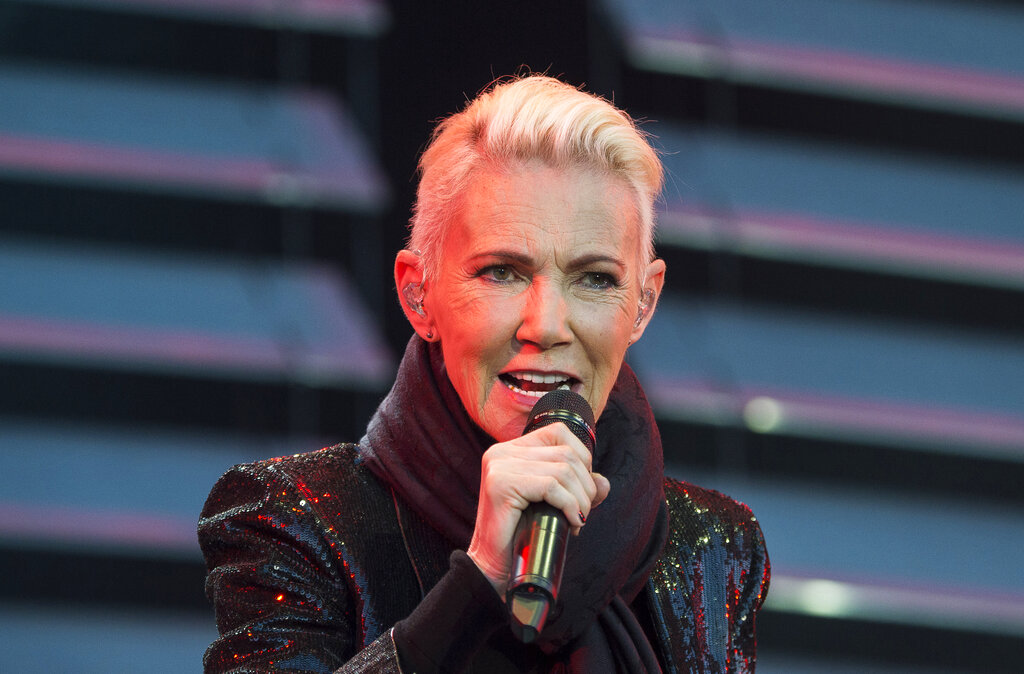Marie Fredriksson, lead singer of Roxette, the Swedish pop duo that briefly ruled the American charts in the 1980s and 1990s with dramatically lovelorn ballads and catchy up-tempo singles, died on Monday. She was 61.
Her management team, Dimberg Jernberg, did not specify the cause of her death but said in a statement on Tuesday that Fredriksson was first diagnosed with a brain tumor in 2002.
Fredriksson and singer-songwriter Per Gessle formed Roxette in 1986. Each had achieved moderate success in Sweden; they decided that together they could strive for international stardom. “Swedish critics said we’d never make it, but they were wrong,” Fredriksson told The Los Angeles Times in 1990.
American critics were often no friendlier. “Old pop formulas never die; they come back with different haircuts,” Jon Pareles wrote in The New York Times in 1992, in a scathing review of the band’s New York debut. He added, “Roxette’s main asset is Marie Fredriksson, a singer with a sob in her voice, a platinum-blond Billy Idol hairdo and a taste for skintight costumes.”
The duo, however, broke through in the United States in 1989 when Dean Cushman, an American student who had visited Sweden on an exchange program, brought a copy of the Roxette album “Look Sharp!” to a local radio station back home in Minneapolis.
The station, impressed by the LP, played the strutting single “The Look”; it became a local hit, before going on to reach No. 1 on Billboard’s Hot 100 chart. American label EMI, which had recently decided not to release Roxette’s music in the United States, quickly reversed course.
Three more Roxette singles topped the charts in the next two years: “Listen to Your Heart,” “Joyride” and “It Must Have Been Love,” the last of which featured on the soundtrack for Pretty Woman, the 1990 romantic comedy starring Julia Roberts and Richard Gere.
Roxette, like Abba before it and Ace of Base after, achieved huge success as a Swedish group singing in English, making immaculately crafted pop music. The duo did not just offer counter-programming to hair metal and grunge, they made a pop melody feel like a statement of lung-busting defiance, even when the lyrics were daft poetry like “tasty as a raindrop.”
On hit power ballads like “Fading Like a Flower (Every Time You Leave),” Fredriksson sounded as if she could triumph over heartbreak by leaning on a sturdily constructed song. “I think somehow I am more vulnerable if I am singing in Swedish,” she said in a video interview from 2000.
Certifying its status as a superstar band, Roxette even got its own stamp in 1991, issued by the Swedish postal service. “It’s nice having the entire Swedish nation licking your back,” Gessle said in Rolling Stone.
Marie Fredriksson was born May 30, 1958, in Skane County in southern Sweden. Her family was poor, but singing was free: She sometimes would wake up her parents by singing early morning opera into her mirror. Fredriksson cited Billie Holiday, Ella Fitzgerald and Chick Corea as early influences; later, her favorites would be Mick Jagger and Tina Turner, whom she admired both for their vocal abilities and for their onstage charisma.
She played with two bands — punk group Strul and new-wave duo MaMas Barn — and released two eclectic solo albums in 1984 and 1986, before joining forces with Gessle.
Explaining their partnership to The Los Angeles Times in 1990, she said: “People ask all the time if we’re married or romantically involved. They insist we are, but we’re not.”
Although Roxette’s popularity in the United States peaked between 1989 and 1991, its career lasted longer around the globe. The band released a total of 10 albums through 2016, seven of them certified platinum in various countries; videos of the duo’s songs have attracted over 1 billion views on YouTube.
Fredriksson’s career was derailed in 2002 when she suffered from a seizure, fracturing her skull on her bathroom floor. Testing revealed that the cause was a malignant brain tumor. Recoveries and setbacks followed, but she kept making music (she made three solo albums after her diagnosis), and in 2012 she embarked on a reunion tour with Gessle.
Her illness made it hard for her to learn new lyrics, but she still remembered all the Roxette hits. “Touring makes her feel incredible,” Gessle told The Guardian. “She gets so much back from the audience — it’s like she’s in the world’s oddest rehab.”
Roxette’s music was never trendy, but as the years went by, it attracted vocal admirers. Derek Miller of the band Sleigh Bells, speaking about Roxette with Spin in 2012, said, “I don’t understand how people get this talented.”
Fredriksson is survived by her husband, music producer Mikael Bolyos — they met when Roxette was touring Australia in 1990, promptly fell in love and decided to marry 48 hours later — and two children, Josefin and Oscar.
In a statement on Tuesday, Gessle paid tribute to Fredriksson as “an outstanding musician, a master of the voice, an amazing performer,” and added, “Thanks for painting my black-and-white songs in the most beautiful colors.”
“Time goes by so quickly,” he said. “It’s not that long ago we spent days and nights in my tiny apartment in Halmstad, listening to music we loved, sharing impossible dreams.”











